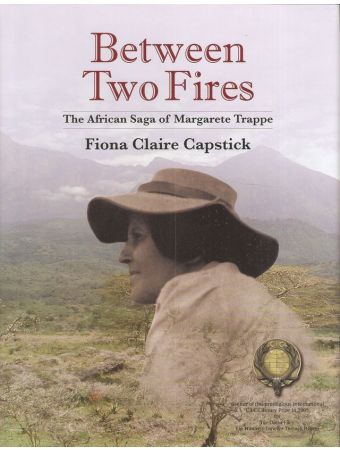BETWEEN TWO FIRES: THE AFRICAN SAGA OF MARGARETE TRAPPE. By Fiona Claire Capstick.
2011 1st edition. Large 4to (215 x 281mm). Ppxxvi,182. B/w photographs, photograph end-papers. Blue cloth, upper board and spine titled in gilt.
"One of the most memorable chapters in the history of early 20th century Africa is now being shared with the Anglophone world for the first time. German East Africa and the subsequent British Mandate of Tanganyika are the backdrop to the astounding life and times of Margarete Trappe, who came out to settle in the German colony in 1907 where she died half a century later. This young woman and her husband Ulrich, trekked on foot over several weeks with their retinue from near Tanga on the coast to the foothills of Mount Meru. This pioneering couple went on to develop an estate of great renown for its livestock, dairy herds, horse stud and agricultural achievements. Margarete had a special affinity with the tribal peoples of her new world who embraced this young woman of translucent goodwill from a distant country and who remained by her side to the very end of her often tortuous life." Margarete Trappe's adult life played out against the background of Germany's colonial experiment which was short and inglorious. Towards the end of the nineteenth century, the German government had laid claim to half of the Sultan of Zanzibar's mainland territories, lost them during the 1914-18 war and then seen them made Mandates of the League of Nations with a view to their future independence. This German East Africa Protectorate became the Mandate of Tanganyika, and then Tanzania when Zanzibar was federated unequally with the mainland at independence. The Trappes' lives consisted of carving out a farm in a region previously unsettled, where Europeans had acquired a hideous reputation in advance through the activities of the German government's colonisation agency, losing the farm during the Great War, getting it back and rebuilding it, going through something very similar during and after the Second World War, and then the upheavals as the African colonies became independent in the 1950s and '60s. More than enough for any lifetime.
"One of the most memorable chapters in the history of early 20th century Africa is now being shared with the Anglophone world for the first time. German East Africa and the subsequent British Mandate of Tanganyika are the backdrop to the astounding life and times of Margarete Trappe, who came out to settle in the German colony in 1907 where she died half a century later. This young woman and her husband Ulrich, trekked on foot over several weeks with their retinue from near Tanga on the coast to the foothills of Mount Meru. This pioneering couple went on to develop an estate of great renown for its livestock, dairy herds, horse stud and agricultural achievements. Margarete had a special affinity with the tribal peoples of her new world who embraced this young woman of translucent goodwill from a distant country and who remained by her side to the very end of her often tortuous life." Margarete Trappe's adult life played out against the background of Germany's colonial experiment which was short and inglorious. Towards the end of the nineteenth century, the German government had laid claim to half of the Sultan of Zanzibar's mainland territories, lost them during the 1914-18 war and then seen them made Mandates of the League of Nations with a view to their future independence. This German East Africa Protectorate became the Mandate of Tanganyika, and then Tanzania when Zanzibar was federated unequally with the mainland at independence. The Trappes' lives consisted of carving out a farm in a region previously unsettled, where Europeans had acquired a hideous reputation in advance through the activities of the German government's colonisation agency, losing the farm during the Great War, getting it back and rebuilding it, going through something very similar during and after the Second World War, and then the upheavals as the African colonies became independent in the 1950s and '60s. More than enough for any lifetime.
£50.00
Availability:
In stock
Book Code
44851
| Author | Capstick (Fiona Claire). |
|---|---|
| Book Code | 44851 |
| ISBN | 0981442447 / 9780981442440. |
| Book Description | Fine new copy in dust-wrapper. |
| Book Cover | Hardcover |
| Published Date | 2011 |
| Publisher | Rowland Ward Publications. |
| Place | Johannesburg, South Africa. |




